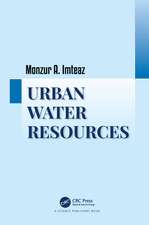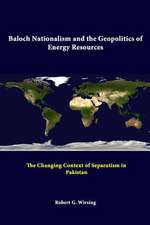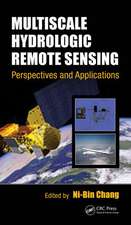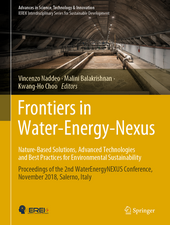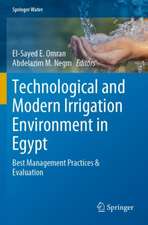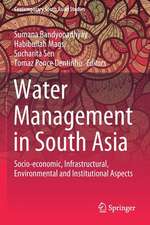Imagining Industan: Overcoming Water Insecurity in the Indus Basin: Water Security in a New World
Editat de Zafar Adeel, Robert G. Wirsingen Limba Engleză Hardback – noi 2016
The Indus basin is shared by four countries (Afghanistan, China, India, and Pakistan). The basin’s significance stems in part simply from the importance of these countries, three of them among the planet’s most populous states, one of them boasting the world’s second largest economy, and three of them members of the exclusive nuclear weapons club. However, the basin’s significance stems also from the great importance of the Indus waters themselves – due especially to the region’s massive dependence on irrigated agriculture as well as to the menace of climate change and advancing water scarcity.
The “Industan” this volume imagines is a definite departure from business as usual responses to the Indus basin’s emerging fresh water crisis. The objective is to kindle serious discussion of the cooperation needed to confront what many water experts believe is developing into one of the planet’s most gravely threatened river basins. It is thus both assessment of the current state of play in regard to water security in the Indus basin and recommendation about where to go from here.
| Toate formatele și edițiile | Preț | Express |
|---|---|---|
| Paperback (1) | 554.10 lei 39-44 zile | |
| Springer International Publishing – 22 apr 2018 | 554.10 lei 39-44 zile | |
| Hardback (1) | 559.00 lei 39-44 zile | |
| Springer International Publishing – noi 2016 | 559.00 lei 39-44 zile |
Preț: 559.00 lei
Preț vechi: 698.75 lei
-20% Nou
Puncte Express: 839
Preț estimativ în valută:
106.96€ • 112.28$ • 88.78£
106.96€ • 112.28$ • 88.78£
Carte tipărită la comandă
Livrare economică 07-12 aprilie
Preluare comenzi: 021 569.72.76
Specificații
ISBN-13: 9783319328430
ISBN-10: 3319328433
Pagini: 175
Ilustrații: XVI, 216 p. 13 illus., 12 illus. in color.
Dimensiuni: 155 x 235 x 24 mm
Ediția:1st ed. 2017
Editura: Springer International Publishing
Colecția Springer
Seria Water Security in a New World
Locul publicării:Cham, Switzerland
ISBN-10: 3319328433
Pagini: 175
Ilustrații: XVI, 216 p. 13 illus., 12 illus. in color.
Dimensiuni: 155 x 235 x 24 mm
Ediția:1st ed. 2017
Editura: Springer International Publishing
Colecția Springer
Seria Water Security in a New World
Locul publicării:Cham, Switzerland
Cuprins
Part 1. Introductory Perspectives.- 1. Introduction (Robert Wirsing).- 2. De-centering per Capita Water supply: The Political Ecology of the Water Scarcity/Security Nexus in the Indus Basin (Majed Akhter).- Part 2. The Costs and Scale of Transboundary Conflict.- 3. Water Insecurity in the Indus Basin: The Costs of Non-Cooperation (Ashok Swain).- 4. The Ebb and Flow of Water Conflicts: A Case Study of India and Pakistan (Kristina Roic).- Part 3. The Potential for Transboundary Cooperation.- 5. The Indus Waters Treaty: Modernizing the Normative Pillars to Build a more Resilient Future (Bjørn-Oliver Magsig).- 6. Managing the Indus in a Warming World: The Potential for Transboundary Cooperation in Coping with Climate Change (David Michel).- 7. Trans-Boundary data Sharing and Resilience Scenarios: Harnessing the Role of Regional Organizations for Environmental Security (Saleem H. Ali).- 8. The Indus Basin: The Potential for Basin-Wide Management Between India And Pakistan (Douglas Hill).- 9. The Indus Basin: The Potential for Basin-Wide Management Between China and its Himalayan Neighbors India and Pakistan (Srikanth Kondapalli).- Part 4. Concluding Perspectives.- 10. The Role of International Development In Reimagining The Indus Basin (Zafar Adeel).- 11. Conclusion (Zafar Adeel).
Textul de pe ultima copertă
This volume calls upon over a dozen Indus observers to imagine a scenario for the Indus basin in which transboundary cooperation over water resources overcomes the insecurity arising from water dependence and scarcity. From diverse perspectives, its essays examine the potential benefits to be gained from revisiting the 1960 Indus Waters Treaty, as well as from mounting joint efforts to increase water supply, to combat climate change, to develop hydroelectric power, and to improve water management.
The Indus basin is shared by four countries (Afghanistan, China, India, and Pakistan). The basin’s significance stems in part simply from the importance of these countries, three of them among the planet’s most populous states, one of them boasting the world’s second largest economy, and three of them members of the exclusive nuclear weapons club. However, the basin’s significance stems also from the great importance of the Indus waters themselves – due especially to the region’s massive dependence on irrigated agriculture as well as to the menace of climate change and advancing water scarcity.
The “Industan” this volume imagines is a definite departure from business as usual responses to the Indus basin’s emerging fresh water crisis. The objective is to kindle serious discussion of the cooperation needed to confront what many water experts believe is developing into one of the planet’s most gravely threatened river basins. It is thus both assessment of the current state of play in regard to water security in the Indus basin and recommendation about where to go from here.
The Indus basin is shared by four countries (Afghanistan, China, India, and Pakistan). The basin’s significance stems in part simply from the importance of these countries, three of them among the planet’s most populous states, one of them boasting the world’s second largest economy, and three of them members of the exclusive nuclear weapons club. However, the basin’s significance stems also from the great importance of the Indus waters themselves – due especially to the region’s massive dependence on irrigated agriculture as well as to the menace of climate change and advancing water scarcity.
The “Industan” this volume imagines is a definite departure from business as usual responses to the Indus basin’s emerging fresh water crisis. The objective is to kindle serious discussion of the cooperation needed to confront what many water experts believe is developing into one of the planet’s most gravely threatened river basins. It is thus both assessment of the current state of play in regard to water security in the Indus basin and recommendation about where to go from here.
Caracteristici
Presents a basin-wide (four-nation) perspective Focuses on transboundary cooperation on the Indus Assesses country-by-country prospects for joint management on the Indus










